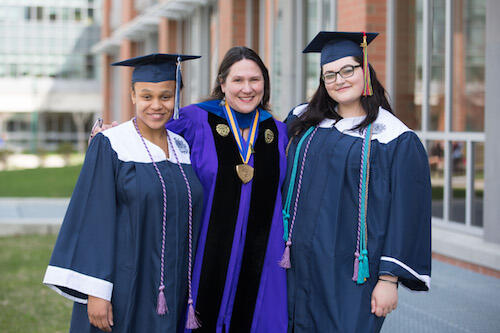
Tanairi Taylor '18, left, Professor of English and Music Melanie Blood, who is coordinator of the women's and gender studies major, and Terese Caiazza ’18. /PHOTO BY KEITH WALTERS '11
Commencement is always a time to celebrate, but this year, Terese Caiazza ’18 and Tanairi Taylor '18 will make College history, becoming the first to graduate with a major in women’s and gender studies.
“I feel so entirely honored!” said Caiazza, who hails from Webster, N.Y. and also majored in sociology. “Not only does this represent my own hard work and success, but that of the many dedicated individuals who gave their time, energy, and passion to legitimize and finalize this major, well before my time here. I’m walking the stage for them, too!”
Taylor, who came to Geneseo from the Bronx and also minored in geology, echoes her classmate.
“It feels good knowing that I am one of the first, especially because this is what I wanted my major to be for such a long time,” she said. “More than anything, I’m honored that I had the time and help from my professors to pursue and complete this degree before I graduated.”
Administratively, Geneseo’s newest interdisciplinary major was six years in the making, though its roots go back 45 years. The College began teaching courses in Women’s and Gender Studies in 1973 — among the first in the SUNY system — and soon thereafter, started offering the program of study as a minor.
The proposal to offer the women’s and gender studies as an interdisciplinary major was approved by College Senate in 2016, clearing the way for New York state review and consideration. It was approved in time so that Geneseo could formally announce the major in fall 2017.
Melanie Blood, who holds a joint appointment as professor of English and music, serves as coordinator of women’s and gender studies. She also teaches its capstone seminar, which brings together higher-level thematic topics that prepare students for the intensity of graduate school.
When she first accepted the position in 2006, the program enrolled five students. It has since grown in stature and popularity, with a consistent student enrollment numbering in the high twenties. This year, 25 students studied in the program — 17 as declared minors, three as concentrators, and five as declared majors. Thirteen are graduating, including soon-to-be alumnae Caiazza and Taylor.
According to Blood, securing two joint faculty tenure lines — another first at Geneseo — was instrumental in gaining program approval. Women’s and gender studies shares faculty with the Department of Philosophy. Assistant Professors of Philosophy Amanda Roth and Heidi Savage teach WGST 330: Feminist Theories and WGST 100: Intro to Women’s and Gender Studies, respectively.
“This is incredibly exciting,” Blood said. “We’ve been working on this for so many years and it takes a lot of work to get to this point. Pioneering the joint tenure track lines for this College represents a new and different kind of commitment to interdisciplinary studies.”
Looking forward, Blood anticipates even greater interest in the program, which students can pursue as either a major, minor or concentration in their academic studies.
“We are really seeing a redefining of what gender means in society because it affects how we navigate the world in our home, social and work lives,” she noted. “We can easily apply gender studies to sociology, psychology, literature and the arts, business, education, legal studies — literally any field — and get an immediately relevant focus in that other area. Whether in our professional or personal lives, nobody is untouched by our new understanding of gender.”
Caiazza agrees, noting that she’s learned as much about herself as the subject she studied.
“Of the many insights I’ve gained as a student of women’s and gender studies, the most valuable is this: the academization of social problems is only as good as the change it promotes in the real world, for real people,” she emphasized. “My studies have helped me recognize how my own experiences with oppression let me stand in solidarity with other oppressed groups … and how I can use my various privileges to advocate for others.”
Similarly, Taylor has also discovered a new way of looking at the world.
“My studies in this major and in other related classes have definitely made me more informed of the condition of the world around me,” she said. “I like to remind myself that there isn’t just one way to be right because it will take a lot of different perspectives and solutions to work together to eliminate oppression.”
As their professor and mentor, Blood cannot contain her enthusiasm for the program’s history-making majors.
“I will be so proud of Terese and Tanairi at commencement because of everyone who has worked the last six years to make this happen,” she affirmed. “These are bright women, and socially active women, and I’m excited to see what they will accomplish. They have tremendous potential.”
Blood credits her predecessors who helped pave the way, including former Dean of the College Susan Bailey and Distinguished Teaching Professor of Psychology Emerita Margaret Matlin, and past and current members of the Women’s Studies Advisory Group. This year’s members include Catherine Adams (history); Jenny Katz (psychology); Amanda Roth and Heidi Savage (philosophy and women’s and gender studies); Alice Rutkowski (English); Linda Steet and Linda Ware (School of Education); and student representatives Emily Arpino (Women’s Action Coalition); Emily Cecala (Voices for Planned Parenthood); Niamh McCrohan (Pride); and Terese Caiazza (Women’s and Gender Studies).
— By Tony Hoppa